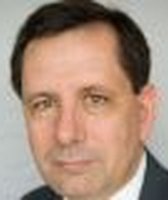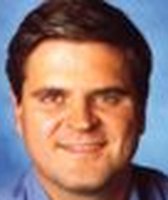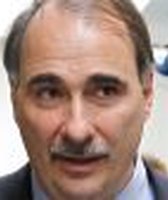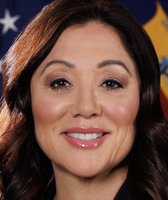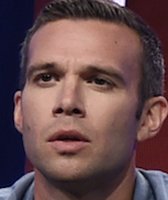Stand up for the facts!
Our only agenda is to publish the truth so you can be an informed participant in democracy.
We need your help.
I would like to contribute
SUMMARY: Sen. John McCain is a staunch proponent of nuclear power, saying it's key to reducing America's dependence on foreign oil and fossil fuels.
Sen. John McCain is a bit of a conundrum to some environmentalists when it comes to energy issues. He's a Republican who has been a leader in efforts to address global warming. But he also has been a staunch proponent of nuclear power, which many environmentalists view as counterproductive.
As part of his plan to reduce America's dependence on foreign oil and fossil fuels, McCain's pitch for more nuclear power plants has been a staple of his stump speeches.
"Why is it that we aren't using more nuclear power in the United States of America today? It's because we haven't addressed the issue of either reprocessing or storing spent nuclear fuel. We can do that," McCain said in a speech on June 2, 2008 in Nashville, Tenn. "Nuclear is clean."
McCain also dropped in a military statistic he is fond of citing.
Sign up for PolitiFact texts
"My friends, the U.S. Navy has sailed ships around the world for 60 years with nuclear power plants on them and we've never had an accident. That's because we have well-trained and capable people."
We checked the Navy's record and found that in the more than 50 years since the U.S. Navy commissioned the world's first nuclear-powered submarine, the USS Nautilus in 1954, there has been nary a single nuclear reactor accident on any of its nuclear-powered vessels. Currently, there are 102 nuclear reactors aboard 80 Navy combat vessels, mainly submarines and aircraft carriers.
Some environmental activists take issue with the relevance of McCain's statistic, noting that the discipline and training at the heart of the Navy's record hasn't always been the norm at commercial power plants in the United States. Still, we rate that claim True.
More controversial are McCain's other statements. "Why is it that we aren't using more nuclear power in the United States of America today? It's because we haven't addressed the issue of either reprocessing or storing spent nuclear fuel. We can do that. Nuclear is clean."
Many environmental and nuclear watchdog groups say McCain is off base in his very premise. They say the main reason there are not more nuclear power plants is simple economics.
"The reason nuclear power plants haven't been built is because they are too expensive," said Tim Greeff, deputy legislative director for the League of Conservation Voters. It is, Greeff said, "the most expensive form of power we have."
And then there is the problem of storage. The federal government proposed a repository for spent nuclear fuel and other radioactive waste in Yucca Mountain in Nevada, but legal and political challenges have delayed its opening for years. Concerns also have been raised about the safety of trucking all that nuclear waste to Nevada. For the time being, most nuclear waste is stored on site at the power plants.
We won't rule on McCain's statement that nuclear is clean, but suffice to say it's a matter of considerable debate.
In a June 5, 2008, news release, McCain was a more precise, calling nuclear energy, "an emissions-free source of electricity for the nation."
It is true that nuclear power plants don't emit greenhouses gasses, the ones at the heart of the debate over global warming.
But that doesn't mean nuclear power is "clean," Greeff said.
"It makes the most toxic substance known to mankind," Greeff said. "It's a tradeoff. Does it emit carbon dioxide, no. But radioactivity is absolutely environmental pollution."
Thomas B. Cochran, senior scientist in the nuclear program at the Natural Resources Defense Council, argues that McCain's plan to subsidize the nuclear industry comes at the expense of other energy alternatives, some of which are faster, quicker and cheaper than nuclear power.
Cochran also takes issue with McCain's suggestion that reprocessing of spent nuclear fuel hasn't been properly addressed. It has been tried and discarded as too expensive and risky, Cochran said. And one of the byproducts of reprocessing is plutonium, which can be used to make nuclear weapons. That creates security risks.
"Nuclear has a unique set of problems," Cochran said. "They are quite different than the problems, say, of coal plants."
The government also has to assume the risk of insuring against a catastrophic accident.
If one of the plants fell victim to sabotage and caused a large radioactive release, the results would be disastrous and long-lived, said Edwin Lyman, a senior staff scientist at the Union of Concerned Scientists in Washington, D.C.
Safety standards have improved dramatically the past couple decades, Lyman said, but "you can't dismiss the possibility of that kind of event."
In a speech in Aiken, S.C., on Dec. 10, 2007, McCain dismissed such talk as fear-mongering.
"We've let the fears of 30 years ago, and an endless political squabble over the storage of nuclear spent fuel, make it virtually impossible to build a single new plant that produces a form of energy that is safe and nonpolluting,'' McCain said.
McCain argues that when his cap-and-trade policy is in place, "there will be a sudden and sustained pursuit in the market for new investment opportunities in low-emission fuel sources."
Groups like the National Wildlife Federation take no position for or against nuclear power.
"We're not opposed to it; we're not for it," said Kurt Zwally, global warming solutions manager for NWF. "The major issue for us is solving global warming."
But he warned against a silver bullet. Instead, he said, the NWF talks about a "silver buckshot" when it comes to solving the United States' energy problems.
"With every energy source, there are downsides," Zwally said. "Nuclear is not a free lunch."
Our Sources
News Channel 5, "McCain Campaigns In Nashville Video," June 2, 2008
Associated Press, "McCain Looks To Nuclear Power, Hydrogen Energy During SC Stop," by Meg Kinnard, Dec. 10, 2007
Las Vegas Sun, "McCain's about-face on Yucca," by Jon Ralston, May 28, 2008
Energy Information Administration, "Nuclear Basics 101"
Foster's Daily Democrat, NH, "During Portsmouth Visit McCain Champions Nuclear Power," by Amanda Dumond, Dec. 7, 2007
Greenpeace, "Selected Accidents Involving Nuclear Weapons 1950-1993," March 1996
Natural Resources Defense Council, "Nuclear Facts: New nuclear power plants are not a solution for America's energy needs," February, 2007
Interview with Tim Greeff, deputy legislative director for the League of Conservation Voters, June 6, 2008
Interview with Thomas B. Cochran, senior scientist in the nuclear program at the Natural Resources Defense Council, June 6, 2008
Interview with Edwin Lyman, a senior staff scientist at the Union of Concerned Scientists in Washington, D.C., June 6, 2008
Interview with Kurt Zwally, global warming solutions manager for the National Wildlife Federation, June 6, 2008
Interview with Lukas McMichael, a public affairs officer for Naval Reactors, June 5, 2008












